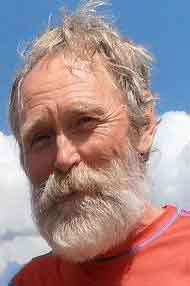 |
| Gordy Ainsleigh |
Why do athletes competing in Mountain Ultra Trail (MUT) races have beards? Because of Gordy Ainsleigh? Or Grizzly Adams?
 |
| Grizzly Adams |
Both Grizzly Adams and our fictionalized across-America-racer Forrest Gump are characters who have become part of our collective memory with full faces of hair. And as we continue to add to the list of our human experience in the ultra community, beards will be a part of that story.
But let's face it, (haha, face it) growing a beard, some epic Ian Torrence chops, or a Snidely Whiplash mustache like Rickey Gates, will not transform us magically into legendary mountain runners.
Running like an animal will. Training with a single-minded focus will. And drawing from the talents and experiences of our ultra community will.
What I find inspiring about mountain ultra runners, with or without beards, is their ability to dream big, fully dedicate themselves and their lives, and to work hard in the face of challenges. If imitation is the sincerest form of flattery, there's a reason we're seeing so many beards. But I've found a few more things to emulate besides facial hair. Some of the best (bearded) runners of the land have a novel and noteworthy approach to life, training, and meeting/exceeding the challenges ahead.
 |
| Forrest Gump |
 |
| The bearded Rob Krar, left, and Timothy Olsen, right, at Western States in 2013. |
"Training for ultras, it's a whole world of complications, and time commitments, and sacrifices," Krar said about his training leading up to being the Western States champion. And Krar explained that at the time he was still adjusting to meeting those challenges. Noteworthy 1: Recognize the Complications.
In Travis Macy's new book, the Ultra Mindset, we learn that these challenges and setbacks are all good mental training. Clearly, our family, life, work, and training regimen combined can create some stresses that Macy explains should be our opportunity to further develop our mental fortitude for our endurance endeavors.
 |
| It was at the 2013 Western States 100 that Rob Krar set the goal to win in 2014. |
was while sitting in a chair next to Western States Champion Timothy Olsen in 2013. It was here that he quietly decided to go for the win in 2014. "I've never set such a lofty and long-range goal for myself," Krar told iRunFar. "And to see it all come to fruition and validate the hard work and the sacrifices -- incredibly satisfying," Krar said of his win. Noteworthy 2: Set Challenging Goals.
Noteworthy 3: Focus. We hear athletes of all stripes say how much mental focus it takes to be a champion. When Krar was asked about other high points along the trail during his 100-mile win at Western States, he couldn't point to highlights along 100 miles and 15 hours of trail running -- and for good reason. "I was incredibly focused the entire race," he said. And he wouldn't let the distractions in until he was almost home, when in the last mile, "I let the emotions start to flow."
Finally, this, Noteworthy 4: Visualize Often. "I don't think there is a day that's gone by the past year where I didn't imagine setting foot on that track," said Krar of his mindset in preparing for Western. So, visualize early and visualize often. Don't shave it for later.